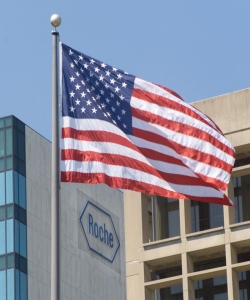Indianapolis, Indiana – An Indiana patent attorney for Eli Lilly and Company of Indianapolis, Indiana; Daiichi Sankyo Co., Ltd of Tokyo, Japan; Daiichi Sankyo, Inc. of Parsippany, New Jersey; and Ube Industries, Ltd. of Yamaguchi, Japan sued in the Southern District of Indiana alleging that HEC Pharm Co., Ltd. of China and HEC Pharm USA Inc. of Princeton, New Jersey (collectively, “HEC Pharm”) infringed Lilly’s patented Effient® product, Patent No. 8,404,703, which has been issued by the United States Patent Office.
This lawsuit adds another defendant, HEC Pharm, to Lilly’s Indiana patent litigation regarding Effient. In these Effient patent-defense lawsuits, Lilly et al. allege infringement of certain patents related to the pharmaceutical Effient. At issue in the litigation against HEC Pharm is only one of the Effient-related patents, 8,404,703 “Medicinal Compositions Containing Aspirin,” (the “‘703 patent”).
This complaint asserts patent infringement arising out of the filing by HEC Pharm of an Abbreviated New Drug Applications (“ANDA”) with the United States Food and Drug Administration (“FDA”) seeking approval to manufacture and sell generic versions of two pharmaceutical products – Effient 5mg and Effient 10mg tablets – prior to the expiration of the ‘703 patent. These patents cover a method of using Effient products for which Lilly claims an exclusively license.
Effient products were approved by the FDA for the reduction of thrombotic cardiovascular events in certain patients with acute coronary syndrome (ACS) who are to be managed with percutaneous coronary intervention (PCI, or angioplasty). Effient products contain prasugrel hydrochloride, which is also known as 5-[(1RS)-2-cyclopropyl-1-(2-fluorophenyl)-2-oxoethyl]-4,5,6,7-tetrahydrothieno[3,2-c]pyridin-2-yl acetate hydrochloride.
The instructions accompanying Effient products state that patients taking Effient products should also take aspirin. The use of Effient products in combination with aspirin for the reduction of thrombotic cardiovascular events in patients with ACS who are to be managed with PCI is allegedly covered by the claims of the ‘703 patent.
HEC Pharm is accused of planning to infringe the patents-in-suit by including with its products instructions for use that substantially copy the instructions for Effient products, including instructions for administering HEC Pharm’s products with aspirin as claimed in the ‘703 patent.
Plaintiffs contend that HEC Pharm knows that the instructions that HEC Pharm intends to include with its products will induce and/or contribute to others using those products in the allegedly infringing manner set forth in the instructions. Moreover, Lilly et al. also contend that HEC Pharm specifically intends for health care providers, and/or patients to use HEC Pharm’s products in accordance with the instructions provided by HEC Pharm and that such use will directly infringe one or more claims of the ‘703 patent. Thus, state Plaintiffs, HEC Pharm’s actions will actively induce and/or contribute to infringement of the ‘703 patent.
The complaint, filed by an Indiana patent lawyer, lists two counts:
• Count I: Infringement of U.S. Patent No. 8,404,703
• Count II: Declaratory Judgment of Infringement of U.S. Patent No. 8,404,703
Plaintiffs ask the court for judgment:
• That HEC Pharm has infringed the ‘703 patent and/or will infringe, actively induce infringement of, and/or contribute to infringement by others of one or more claims of the ‘703 patent;
• That, pursuant to 35 U.S.C. § 271(e)(4)(B), HEC Pharm be permanently enjoined from making, using, selling or offering to sell any of its accused products within the United States, or, where applicable, importing accused products into the United States prior to the expiration of the ‘703 patent;
• That, pursuant to 35 U.S.C. § 271(e)(4)(A), the effective date of any approval of the HEC Pharm ANDA under § 505(j) of the Federal Food, Drug and Cosmetic Act (21 U.S.C. § 355(j)) shall not be earlier than the later of the expiration dates of the ‘703 patent, including any extensions;
• If HEC Pharm commercially makes, uses, sells or offers to sell any accused product within the United States, or, where applicable, imports any accused product into the United States, prior to the expiration of either of the ‘703 patent, including any extensions, that Plaintiffs be awarded monetary damages for those infringing acts to the fullest extent allowed by law and be awarded prejudgment interest based on those monetary damages;
• That the case be deemed exceptional under 35 U.S.C. § 285;
• That the ‘703 patent remains valid and enforceable;
• That Plaintiffs be awarded reasonable attorney’s fees, costs and expenses.
Practice Tip #1: The Effient litigation also involves Patent No. 5,288,726, “Tetrahydrothienopyridine Derivatives, Furo and Pyrrolo Analogs Thereof and Their Preparation and Uses for Inhibiting Blood Platelet Aggregation,” and Patent No. 8,569,325, “Method of Treatment with Coadministration of Aspirin and Prasugrel.”
Practice Tip #2: The FDA’s ANDA process for generic drugs has been abbreviated such that, in general, the generic drug seeking approval does not require pre-clinical (animal and in vitro) testing. Instead, the process focuses on establishing that the product is bioequivalent to the “innovator” drug that has already undergone the full approval process.
The statute that created the abbreviated process, however, had also created some interesting jurisdictional issues with respect to declaratory judgments. For an interesting look at some of the issues, see here
Continue reading
 Indiana Intellectual Property Law News
Indiana Intellectual Property Law News


 patent infringement in the
patent infringement in the  Active Systems, Inc.
Active Systems, Inc. Germany and
Germany and